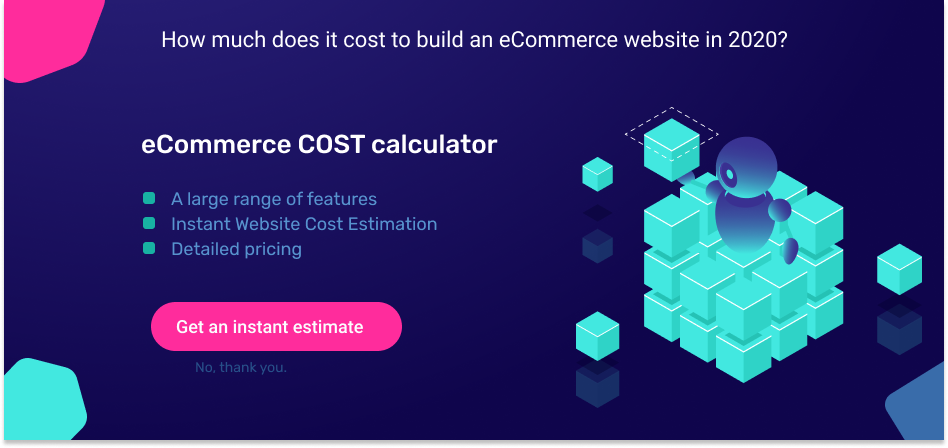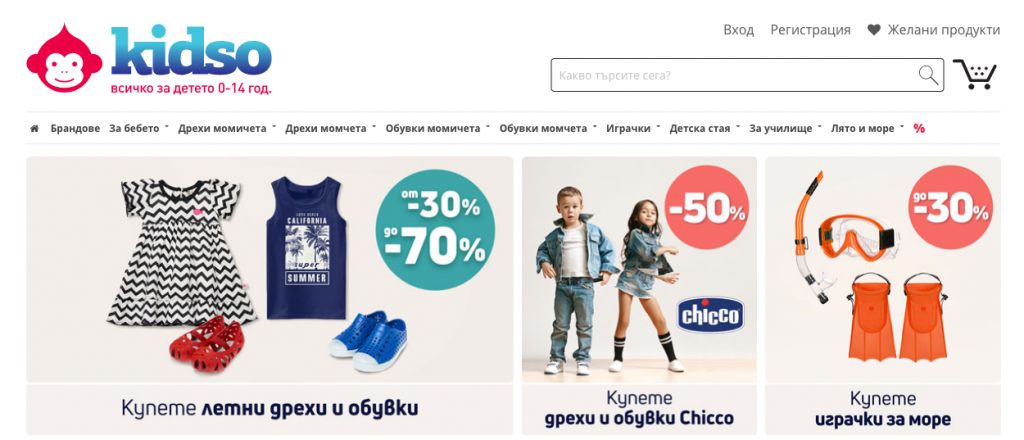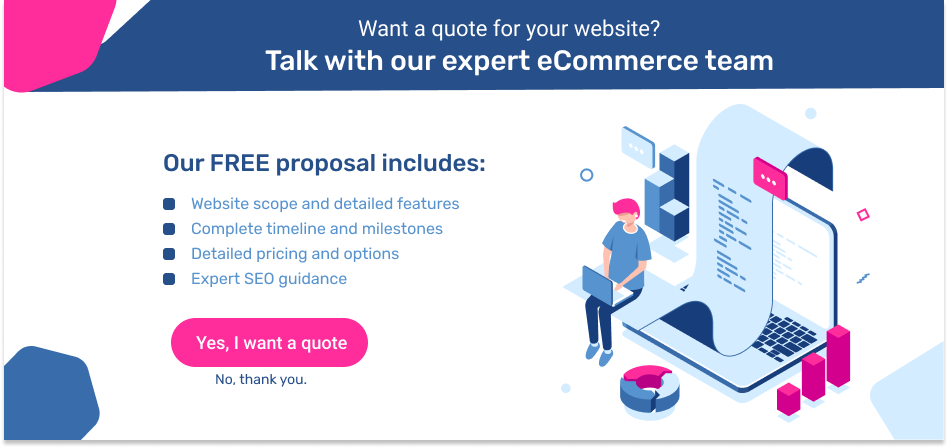How Much Does it Cost an Ecommerce Website In 2021 (Time to Stop Making Excuses)
Last updated on Oct 5, 2021
Ecommerce websites come in all shapes, sizes, and — of course — prices. And the price question tends to pop up way too early in the conversation before we as an agency have even had the chance to discuss the project in detail.
Who is to blame? No one wants to waste their precious time and energy just to end up walking away from a company because the project estimate doesn’t match their budget.
Every time I try to explain the number of factors that influence the price of creating an ecommerce website, customers follow up with the same question:
“But Elena, could you at least give me a ballpark figure?”
Honestly, this “ballpark figure” approach seldom works in anyone’s favor. Most of the time we shot in the dark with a figure that reflects our current understanding of the client’s needs and is rarely correct because we simply haven’t gathered enough information yet.
And then… An underquote makes the customer think we’re raising the price to cheat them (“What happened to your first estimate?”). An overquote causes us to lose the customer before we even start.
This got me thinking: how can we quickly satisfy the customer’s need for an estimate, while at the same time receiving the information, we need to make that estimate reliable?
Solution: That’s why we created the Ecommerce Cost Estimate Calculator, a tool that gathers the customer’s data to quickly and automatically provide a realistic estimate.

The best part? The calculator only takes less than 5 minutes to complete. You can play around with features and different scenarios and adjust the cost to match your budget in real-time.
The Problem: Non-transparent pricing puts clients against developers
The еcommerce market is desperate for an open and upfront answer about cost. Yet development companies don’t want to risk setting cost expectations too high or low before we’ve had a chance to understand the complexity of our client’s needs and goals.
There are two main questions I ask potential clients before estimating an ecommerce website cost: “What are your sales and traffic goals?” and “What custom features will you need for the website to meet them?” Your answers can vary greatly depending on whether you’re a start-up, market leader, or something in between. So it makes sense that ecommerce website development costs can vary greatly, too.
Related: 6 Tactics for Success for Retail Brands In the Post-Pandemic Era
For example, if you want to do $50,000 a year in sales, you can probably find an ecommerce website for around the $8,000 range. If you’re looking to do millions in sales, then the cost of your ecommerce website will be much, much higher because more features and functionality will need to be built to gain a market edge.
You will ask, why does this affect cost? Your overall sales and traffic goals determine the technology requirements, hardware, and software. If you have a huge customer base and make millions of sales, you will require a website and supporting applications that can handle heavy traffic. This dictates the technology you use and the type of network, servers, and other hardware required. This also dictates the size and expertise of your development team.
Remember: Starting an ecommerce website is like starting any real business. It takes capital, planning, and a solid team to be successful. We work alongside our clients to be part of that successful team.
What is the cost of an ecommerce based on WooCommerce, Prestashop, Magento?

Let’s first take a look at some of the frequently requested pages of a not so complex ecommerce website:
- Main page
- Category pages
- Product pages
- Shopping cart
- Favorites
- Check out
- Blog
And the features:
- Integration with payment systems like credit cards, Apple Pay, Google Pay, PayPal, etc.
- Personalized push notifications
- Recently viewed products
- Leave reviews and rate products
- Search
- Admin panel
Note: Features and pages may both vary depending on a project. So does the final price. For more accurate estimation take our Ecommerce cost calculator – you will get an instant quote and will be presented with many features to choose from.
E-commerce website development price for a project of that size can vary between 2,700 EUR and 15,900 EUR.
What is the cost of building a custom ecommerce?

When you want a large e-commerce website, it has to be well-architected to sustain high loads and rank well on search engines. In most cases, this means that a custom ecommerce solution is the best way to go. This allows a lot of customisations and integrations with 3rd party tools.
Along with the common ecommerce pages and features (see a full list of 100+ ecommerce features explained here), two things that may raise the cost significantly are:
• Marketing and SEO – A fully integrated marketing plan will boost the cost of the build, but it may be critical for driving traffic to your ecommerce and delivering ROI.
• Integrations and custom functionality – Making an eCommerce website work with an ERP or other third-party systems can often cost thousands.
Examples of 3rd Party Integrations + Custom Functionalities
- Shipping + Fulfillment: Shipping Easy, Shipstation, Aftership, Narvar, Dropstream, NRG (Filemaker)
- Accounting: Xero, Freshbooks, Quickbooks
- Payment: Sezzle, Afterpay, Affirm, Apple Pay, Stripe, Amazon Pay, Paypal
- Email Marketing: Mailchimp, Constant Contact, Kylavio, Drip, Convertkit
- Tax: Avalara, Avatax, Taxjar
- Inventory: Unleash, TrackGecko, Apparel Magic, Accumula, Webgility
- CRM: Hubspot, Salesforce, Pardot, Insightly, Agile CRM, Infusion soft, Freshdesk
- Product Review: Yotpo, Wiremo, Stamp,
- Gift Card: Pimwick
- Video: Youtube, Vimeo, Wistia
- Analytics Tracking: Google Analytics, Hotjar, Mouseflow, Glue
- Other: AWS, Gravity Forms, Advanced Custom Fields, ReferralCandy
What is an ERP Integration? An ERP (Enterprise Resource Planning) is a host of software that manages your inventory, shipping (“3PL”), invoicing, and other back-office services. Good developers will create cohesion across these back-office systems to help your website achieve more.
Do you need an ERP Integration? When a significant portion of your or your team’s time is spent performing necessary yet seemingly trivial tasks that don’t add value, then it may be a good time to think about ERP integration.
Examples of ERP Systems: Sage, SAP, Microsoft Dynamics, Netsuite, Apparel Magic, Filemaker, Oracle
Custom e-commerce website development price can vary between 8,700 EUR for a really basic custom ecommerce and 56,300 EUR+
What is the cost for redesigning your current ecommerce?
Maybe the best approach to accurately assess the cost involved in redesigning your current ecommerce website is to use our redesign cost formula:
COST = BASE + (BASE x AOV) + (BASE x SKU Variants) + (BASE x Orders) + (BASE x Customers) + (BASE x # of Integrations) + (BASE x ERP{ Integration?)
If it looks complicated, you do not have to worry. Follow the steps below and you will soon have it all calculated.
Step 1: Annual Ecommerce Revenue (BASE)
Annual ecommerce revenue is the revenue you can directly attribute to your ecommerce store. Your BASE is equal to 3% of your Annual Ecommerce Revenue (AER).
Let’s take for example, that you AER is $500,000, then:
BASE = 3% of AER = 0.03 x $500,000 = $15,000
Step 2: Average Order Value (AOV)
AOV tracks the average dollar amount spent each time a customer places an order on your website. For example, Customer A purchased a product on your store for $200 and Customer B purchased a product for $100. The AOV for these 2 customers would be $150.
Our average order is $150 dollars.
| Average Order Value (AOV) | % of BASE |
|---|---|
| Less than $50 | 0% |
| $51 to $100 | 25% |
| $101 to $250 | 50% |
| Greater than $250 | 75% |
In our case, the costs for Average Order Value are 50% of BASE (look at the table above – for the range of $101 to $250 the BASE is 50%. So:
Average Order Value Cost = 50% of BASE = 0.5 x $15,000 = $7,500.
Step 3 – Total SKUs Variants in your Product Library
What is a SKU? By definition, a stock keeping unit (SKU) is a number assigned to a product to identify its variants (price, size, and colors).
Why does this affect the cost? Simple: the more SKUs you have in your product library, the more data your website needs to store or move. (It takes less time to migrate 50 products than 2,000.)
For example, if you have 500 SKUs, your costs for product data are 3% of BASE (look at the table below)
| Product Variants (SKUs) | % of BASE |
|---|---|
| Less than 50 | 0% |
| 50 to 500 | 3% |
| 501 to 2500 | 5% |
| 2501 to 5000 | 7% |
| Greater than 5000 | 10% |
Product Data Cost = 3% of BASE = 0.03 x $15,000 = $450.
Step 4 – Total Order History
A total order history includes all orders that have been made previously on your ecommerce store.
Orders are data. Like with product data, migrating tens of thousands of order data is a significant time investment. Migrating past orders correctly is important, especially if you want to give your customers the ability to reorder items from orders stored in their account.
If you have 1500 orders, then your estimated order data costs are 5% of BASE
| Orders | % of BASE |
|---|---|
| Less than 1000 | 0% |
| 1000 to 5000 | 5% |
| Over 5000 | 10% |
Order Data Cost = 5% of BASE = 0.05 x $15,000 = $750.
Step 5 – Total Customer History
The total number of Ecommerce customers you had last year (or for the whole time you’ve run the website). The size of your customer base determines the technology requirements, hardware and software. If you have a large customer base, you will require a website and supporting applications that can handle heavy traffic.
If you have 5,000 customers, then your estimated customer data costs are 10% of BASE.
| Customers | % of BASE |
|---|---|
| Less than 500 | 0% |
| 500 to 2500 | 5% |
| Over 2500 | 10% |
Customer Data Costs = 10% of BASE = 0.10 x $15,000 = $1,500.
Step 6 – Number and difficulty of third-party integrations
Almost all Ecommerce websites require some level of third-party support. This can complicate your costs.
If you have a total 5 3rd party integrations, the integration cost will be in the following ranges:
| API integrations | % of BASE |
|---|---|
| Less than 4 | 0% |
| 4 to 7 | 10% |
| Over 7 | 20% |
| Over 7 + Custom API functionality | 30% |
In this case your estimated customer data costs are 10% of BASE.
3rd Party Integrations = 10% of BASE = 0.10 x $15,000 = $1,500.
Step 7 – ERP Integration
ERP (Enterprise Resource Planning) is a piece of software that manages your inventory, shipping (“3PL”), invoicing, and other back-office services.
If you have an ERP integration that doesn’t require any custom solution implementation, then your estimated customer data costs are 10% of BASE.
| ERP Integration | % of BASE |
|---|---|
| No | 0% |
| Yes | 10% |
| Yes + Custom Solution Implementation | 30% |
Customer Data Costs = 10% of BASE = 0.10 x $15,000 = $1,500.
So, let’s do the final math:
The values:
BASE = 3% of AER = 0.03 x $500,000 = $15,000
AOV = 50% of BASE = 0.50 x $15,000 = $7,500
SKUs = 3% of BASE = 0.03 x $15,000 = $450
Orders = 5% of BASE = 0.05 x $15,000 = $750
Customers = 10% of BASE = 0.10 x $15,000 = $1,500
APIs = 10% of BASE = 0.10 x $15,000 = $1,500
ERP = 10% of BASE = 0.10 x $15,000 = $1,500
The formula:
eCommerce cost = BASE + (BASE * AOV) + (BASE * SKUs) + (BASE * Orders) + (BASE * Customers) + (BASE * APIs) + (BASE * ERP).
Let’s add in the values to the formula and calculate:
eCommerce cost = 15000 + (15000 * 0.50) + (15000 * 0.03) + (15000 * 0.05) + (15000 * 0.10) + (15000 * 0.10) + (15000 * 0.10)
eCommerce cost = 15000 + 7500 + 450 + 750 + 1500 + 1500 + 1500
eCommerce cost = 28 200 EUR
Remember: this number includes everything – design, development, data migration, integrations, etc.
Final Cost by Types
Below, you can see rough numbers for building an eCommerce website based on different platforms.
How much does it cost to develop an ecommerce website (rough):
| Ecommerce | Cost (min) | Cost (max) |
|---|---|---|
| WooCommerce | 2,700 EUR | 15,900 EUR |
| Prestashop / Opencart | 4,220 EUR | 27,800 EUR |
| Magento | 5,470 EUR | 35,800 EUR |
| Custom PHP | 8,700 EUR | 56,300 EUR |
| Re-design | 22,000 EUR | 78,000 EUR |

Have a question?
Contact our CEO Elena if you want to know more. She'll be happy to help you!
Contact Elena